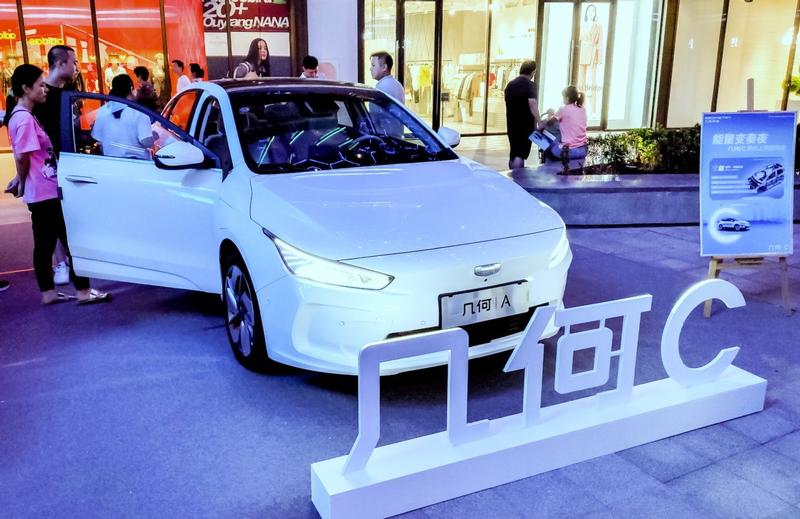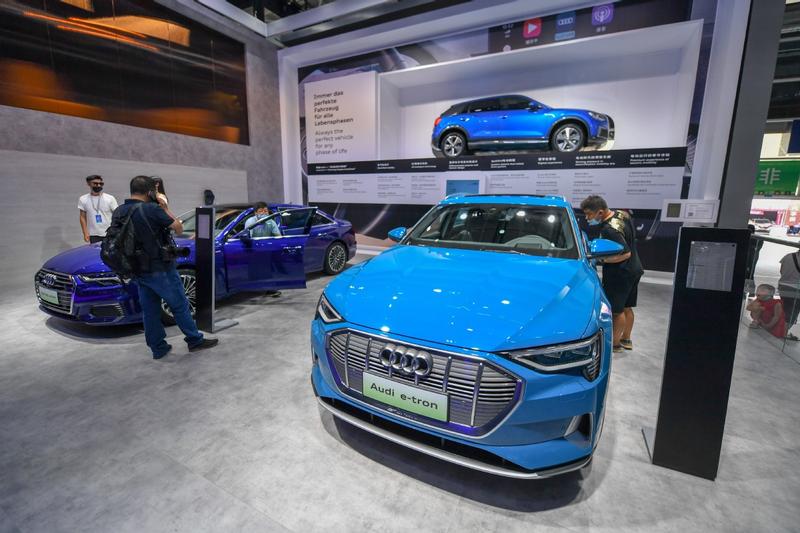 Customers check out an electric car developed by Geely Auto at a mall in Zhengzhou, Henan province, on Aug 21, 2020. (WANG ZIRUI / FOR CHINA DAILY)
Customers check out an electric car developed by Geely Auto at a mall in Zhengzhou, Henan province, on Aug 21, 2020. (WANG ZIRUI / FOR CHINA DAILY)
Automakers worldwide are racing to partner with Chinese companies in the new energy vehicle sector as they push deeper to explore the potential of the latest wave of changes in the industry.
The government's ambition and prospects in the world's largest vehicle market are attracting foreign carmakers to boost investment in China
In China, combined sales of electric cars, plug-in hybrids and fuel cell vehicles exceeded 5 percent of total vehicle deliveries for the first time in the first half of 2019, and the Ministry of Industry and Information Technology expects the figure to reach 25 percent by 2025.
The government's ambition and prospects in the world's largest vehicle market are attracting foreign carmakers to boost investment in China.
Japan's No 1 carmaker Toyota established a Beijing research facility dedicated to fuel cell vehicles on Aug 20 in partnership with State-owned carmakers FAW, Dongfeng, GAC and BAIC as well as Beijing SinoHytec Co, a Chinese fuel cell engine maker.
Toyota holds 65 percent of the joint venture-United Fuel Cell System R&D-with a registered capital of 1.67 billion yen (US$15.81 million).The facility's total investment is expected to grow to US$50 million, according to their plan.
 Visitors check out Audi electric cars at the China Changchun International Automobile Expo held in Jilin province in July. (PHOTO / XINHUA)
Visitors check out Audi electric cars at the China Changchun International Automobile Expo held in Jilin province in July. (PHOTO / XINHUA)
The Japanese carmaker is one of the biggest backers of fuel cell vehicles, betting they will become the ultimate solution in future transportation modalities, and China's ambition in the sector has attracted Toyota's interest.
In a plan announced in 2016, China hopes to have 1 million fuel cell vehicles on its roads by 2025. In a statement, Toyota's operating officer Shigeki Terashi said: "There is no other automobile market with such a sense of speed. By working with companies that have considerable influence in China's commercial vehicle market as well as SinoHytec-which has reliable technological capabilities-I believe that we will be able to establish the foundation for the widespread use of fuel cell vehicles in China."
General Motors is speeding up its electrification efforts in the country as well. The United States' largest automaker said over 40 percent of its new models in China over the next five years will be electrified and will be manufactured locally.
"As GM's largest market and a global center of innovation, China will play a crucial role in making our vision a reality," said Mary Barra, GM chairwoman and CEO, at an online event on Aug 19.
"With our joint venture partner SAIC, we are blending global insights and scale with local market expertise to redefine what is possible for our customers and for society," Barra said.
German companies are partnering with Chinese battery makers to gain a better foothold in China and other markets.
ALSO READ: Hazards with Leading Ideal One puts NEV safety in spotlight
Mercedes-Benz has chosen Contemporary Amperex Technology Co Ltd as its major battery supplier. CATL is a global leader in the development and production of lithiumion batteries. In 2019, its battery production capacity reached 40.25 gigawatt-hours.
"Working with CATL will see us accelerate our transformation toward carbon-neutrality," said Markus Schaefer, a board member of Daimler AG and its subsidiary Mercedes-Benz.
The two companies have started working on battery products that will be used in vehicles within the next few years.
Daimler announced in July that it is acquiring a stake of around 3 percent in Chinese battery cell maker Farasis Energy.
The carmaker did not give an exact investment figure for the equity, but said it is investing "multimillions" of euros in Farasis' initial public offering on China's Nasdaq-like STAR board.
A stake in a Chinese battery cell maker will enable the company to further leverage the potential of advanced technology partners to pursue its global electrification strategy, said Hubertus Troska, a board member of Daimler AG responsible for its China business.
"China is the world's largest electric car market with tremendous potential for further development. We are working with strong and trusted partners in China, not only to enhance our local footprint but also to strengthen our competitiveness worldwide," Troska said.
China overtook the United States in 2015 as the largest market for electric cars, plug-in hybrids and fuel cell vehicles, and has since held the lead.
Last year, sales of such vehicles in China totaled 1.2 million, according to the China Association of Automobile Manufacturers.
Affected by COVID-19, these sales could fall to 1.1 million this year, said the association's vice-chief engineer Xu Haidong.
Volkswagen AG is confident in the sector's long-term potential. "China is determined to make new energy vehicles a success and Volkswagen is determined to make it a success, and I am confident it will happen," said Volkswagen Group China CEO Stephan Woellenstein.
Despite the estimated fall in such vehicle sales this year, the carmaker said it will not alter its sales goal of delivering 1.5 million vehicles in China by 2025.
The German carmaker is in the process of acquiring a 26 percent share in China's No 3 battery maker Gotion.
The 1 billion euros (US$1.19 billion) deal, expected to be completed later this year, will make the German car giant Gotion's largest shareholder.
Herbert Diess, CEO of Volkswagen AG, said the partnership is an opportunity for Volkswagen to achieve deeper know-how in the field of batteries.
READ MORE: Dual credit plan will boost NEV development in China
Gotion has a number of projects over the entire battery value chain from sourcing, development and production to recycling.
Volkswagen said Gotion will supply batteries to its three joint ventures in the country, two of which are making vehicles on Volkswagen's electric platform.
Two models built on the platform will launch before Spring Festival, said the company.


